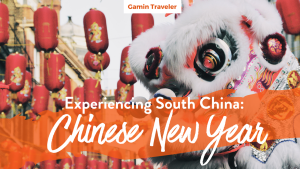
Have you ever enjoyed Chinese New Year with locals? I was able to enjoy this amazing experience during my last trip to China. Today, I´ll tell you all the things that I learned spending Chinese New Year with locals. About their culture, the way they live, and their food.
The Chinese New Year, just like other culture’s New Year celebrations, are celebrated extravagantly to say ‘thank you’ to the year that passed and to bring in good luck for the coming New Year. Chinese people are particularly superstitious during this week-long celebration and still believe until now that following the rules will keep you prosperous for the coming year.
To reach South China, I traveled overland from North Vietnam. This was in the middle of my South East Asian trip. I was supposed to meet a Couchsurfing host in Hunan and celebrate Chinese New Year with locals. This trip gave me a much deeper insight into the Chinese culture. And it felt to me like scratching beneath the usual-Chinese-surface we know.
Things I learned about celebrating Chinese New Year with locals
They are actually open to hitchhiking.
Hitchhiking in South China was surprisingly really good. Due to the Chinese New Year week, there wasn’t too much traffic, but luckily no long waiting times to get rides. From the border, I hitchhiked to Liuzhou, and to Yangshuo, until I reached Hunan. While hitchhiking, I experienced how hospitable Chinese people are. They were driving me around, showing me the city, and treating me for food. The only challenging part during the hitchhike in South China was communicating with the locals what exactly I was doing. I asked for rides near the toll roads and I was bringing with me a paper with a Chinese translation that I was hitchhiking.
They have very good food
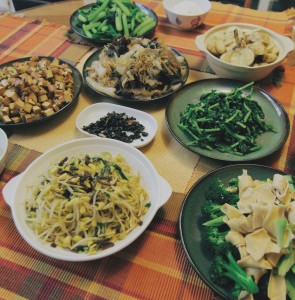
Another interesting observation is how lunch time is “sacred” to them. I immediately learned that people eat their lunch at 12 noon, on time, every day. Whatever you are doing at around 11:30 am, you can assume that they are already thinking about lunch. I also had my first experience of trying stinky tofu in Hunan, where it is normally served. It looks weird, because of the very bad smell and the black color of the tofu. But it was really delicious and I tried it with a spicy sauce – a really good combo.
Chinese people have so much superstition surrounding the food they prepare for New Year.
When I was celebrating Chinese New Year with locals, I had the opportunity to eat some of the great food they prepared that was meant to bring good luck.
- Noodles– Okay this one’s not only a New Year celebratory food but really a breakfast staple. Good thing, I love noodles! Long noodles are believed to bring long life.
- The Tray of Togetherness– This one’s full of sweets, and I love just being able to share with the families I visit. Anyone visiting a family in the New Year, mostly relatives, can snack on The Tray of Togetherness. It’s usually composed of different bite-sized food and sweets, with a tray of 8 (lucky number) compartments. Coconut brings luck for togetherness, longans the possibility of having many sons, red melon seeds to give you happiness throughout the years, and preserved kumquat for prosperity.
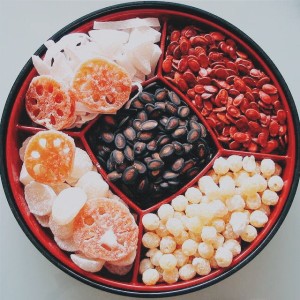
I also ate fried rice, dumplings, spring and egg rolls, and much more noodle dishes and tea with various families. The vibe around all the families was very happy, and I think in a traditional celebration such as the Chinese New Year, that’s one of the most important things.
![Chinese Prosperity Food with Salmon Photography: ProjectManhattan (Own work) [CC BY-SA 3.0], via Wikimedia Commons](http://bestplacesofinterest.com/wp-content/uploads/2016/02/Prosperity-Salad-New-Year-300x225.jpg)
They love having tea. Thus, the tea ceremony.
Chinese people love having tea. They also have the traditional tea ceremony. Tea is used for its medicinal properties, its religious bearings, and for the peace and calms it brings to the one taking it. I personally enjoyed tea time because it was a time for the family to talk, and it was a special time of sharing and just “being” with them. I was practicing my Chinese with them, and we tried to have great conversations even with the little Chinese I know.
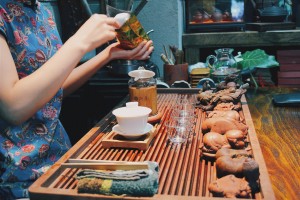
They welcome the coming year with a bang.
Celebrating Chinese New Year with locals, people will instantly realize how superstitious they are – a huge part of their culture. They have the Chinese Zodiac that influences a lot of their decision-making and attitude in the coming year. A lot still use it as a guidance for how they will live their everyday lives. New Year is celebrated big in China. People even stop working for a few days or a week. They usually celebrate with family. Eating too much food, having tea and drinking alcohol. 2014 was the year of the horse. You can see various horse figurines and photos, different objects that are supposed to bring you luck in the coming year. I didn’t buy one, though. I guess that shows how not superstitious I am. ha! And of course, let’s not forget how “noisy” the Chinese New Year is – celebrated with fireworks, firecrackers, and people making noise everywhere. This is believed to scare the bad spirits away and welcome a good New Year.
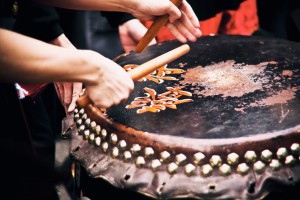
They follow certain “rules” of respect.
I discovered various amazing things, celebrating the Chinese New Year with locals. Chinese people are very generous. Hosted by a family, they were always offering me food. When they do, you need to receive the food with two hands. This shows your respect and appreciation for the food offered to you.
Every time a male visitor or relative comes to the house and sees me, they usually show their surprise and offer me a cigarette. Even if I don’t smoke, I usually receive the cigarettes given to me with two hands to show my respect. The women don’t usually show any reaction when they see a visitor. They are very shy, and will just look at you.
Food is usually served on the table, ready for you to just get the food yourself. However, people usually serve the food for me. They also eat with them holding their bowls close to their face, compared to eating with the food on the table. You will have to follow suit, to show your respect. During a wine toast, you need to position your glass lower than that of the other person you’re toasting glasses with. This is another sign of respect. If they say, “Gambei” (meaning Cheers), you will need to finish your glass in one gulp. I did this, drinking a strong liquor (53% alcohol), and the taste was burning for a couple of minutes.
They have other “curious” beliefs and rules.
We’d love to know if you believe in Chinese Zodiac and their readings. Here’s a really interesting guide on Zodiac for this Red Monkey Year that you might want to read. For me, I always believe that you create your own luck and that the best things life has to offer should be met by preparation and hard work. So, we hope you read your zodiac with an “open mind”. The last thing you want is to feel bad about your future. If you’re on a journey of travel this year, this article can be interesting for you. It’s not solely about travel, but with “stars” on how much luck you have with love, prosperity, health and career this year. Let me know what you think!
If you fancy reading an article, with a lot of amazing red monkey art and read more about what “may” happen this year based on more traditional beliefs, here’s one from the Korean Herald.

If you feel you need help with the luck you’re about to get this year, try Wishing Trees and checking this online Feng Shui store. Again, we believe you make your own luck, so we’d rather you just have fun reading all these advice.
There were many more things I saw and learned that you wouldn’t usually see with the other countries. During that year´s Chinese New Year with locals, I learned about their rules on birth and having children. At that time, if you already have one child and you are in the city, having a second child means you will have to pay high taxes. In the countryside, you are allowed to have a “second try” for a child if your first baby is female. Supposedly, male children are important for farm life.
In China, it was also too difficult to see the bright blue skies because of too much pollution.
Chinese people also use chopsticks for everything. They only use a small spoon for drinking your soup, and for everything else, you need to use chopsticks: rice, noodles, chicken, and more.
Parks are crowded in China. You can see people walking around parks and playing a sport, like yoga and badminton.
Chinese people go crazy for Mahjong, a very common board game in China. This is similar to the Western game, Rummy. It’s a game of strategy, skill and calculation. There are 4 players. The game is played with a set of 144 tiles of Chinese characters and symbols. In turn, players draw and discard tiles until they complete a legal hand using the 14th drawn tile to form 4 groups. It was a tough game to play and although I was able to learn it, I was playing so slow while the others were very fast.
South China was definitely one of the less-traveled places I visited, and I was happy I did it. I don’t know how I could have experienced a more authentic Chinese New Year with locals than this trip I had.
How was your experience celebrating the New Year? Are there any traditional beliefs that you agree more with or don’t like? We believe in respecting everyone’s culture so if you can respectfully say your comments about Chinese New Year traditions, we’d love to hear about them in the comments! We want to know what you believe in and what your opinions are.
Happy Chinese New Year everybody!!!
Source: The Gamin Traveler – Ruben Arribas is a Spanish traveler who has traveled more than 70+ countries around the world. He believes in travel without money. Recently, he finished a bicycle trip, 9500 km, from Madrid to North Cape.

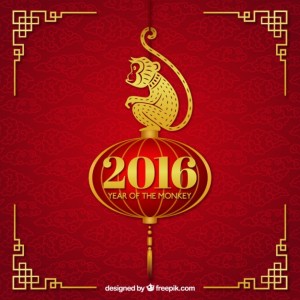
Our Chinese neighbors stapled bright red banners to their front doors. Happy Chinese New Year!
A beautiful and enriching post. The Chinese speak less observe more and accomplish humbly. 🙂
I am glad you liked the post. Thanks for stopping by.:)
So much information and pictures… It’s a beautiful post and I got to know so much about China.. You can’t see the blue skies due to pollution? My God, I hope the steps Chinese govt is taking will make a difference…. THanks for this wonderful share 🙂
I am glad you liked it. Thank you for stopping by and do keep visiting. 🙂